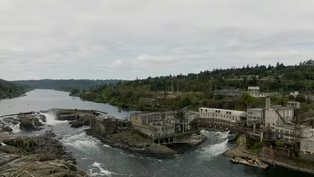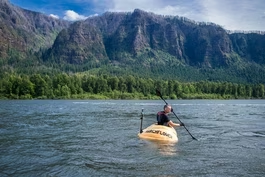Oregon Field Guide
Saving Breitenbush
Clip: Season 37 Episode 2 | 9m 6sVideo has Closed Captions
How firefighters saved an Oregon historic hot spring during the 2020 Labor Day fires.
When evacuation notices began on September 6, 2020 during the Labor Day fires, Breitenbush Fire Chief Jordan Pollack was some 300 miles away in Port Townsend, Washington, coordinating efforts as the off-land manager of his fire department. By the next day, he and his firefighting crew would be the last line of defense against a megafire that was threatening to wipe the historic resort off the map.
Problems playing video? | Closed Captioning Feedback
Problems playing video? | Closed Captioning Feedback
Oregon Field Guide is a local public television program presented by OPB
Oregon Field Guide
Saving Breitenbush
Clip: Season 37 Episode 2 | 9m 6sVideo has Closed Captions
When evacuation notices began on September 6, 2020 during the Labor Day fires, Breitenbush Fire Chief Jordan Pollack was some 300 miles away in Port Townsend, Washington, coordinating efforts as the off-land manager of his fire department. By the next day, he and his firefighting crew would be the last line of defense against a megafire that was threatening to wipe the historic resort off the map.
Problems playing video? | Closed Captioning Feedback
How to Watch Oregon Field Guide
Oregon Field Guide is available to stream on pbs.org and the free PBS App, available on iPhone, Apple TV, Android TV, Android smartphones, Amazon Fire TV, Amazon Fire Tablet, Roku, Samsung Smart TV, and Vizio.
Providing Support for PBS.org
Learn Moreabout PBS online sponsorship(fire burning) - [Pollack] That thing came in at 100 miles an hour, and took out seven communities ultimately, and 400,000 acres of forest.
That's a large fire, and at that point, you know, Mother Nature wins.
Breitenbush is a special place to many people in Oregon and far beyond.
It has 100-plus year-old historic lodge, and it's also a spiritual center.
Our concern, our complete focus is about the buildings.
We're not gonna be able to put out the fire that's in the forest around there.
That's just not happening.
Unfortunately, I wish we could have.
- [Moore] The fire came through and destroyed century-old and more buildings and nearly half of the structures and so much of our infrastructure.
Decades of labor wiped out in the space of a day or two.
- Three of us left after things were stabilized and then came out at the bottom at Detroit to find the entire town gone.
And at the moment I felt like, wow, we just drove in into the mouth of the dragon and came out.
It's (beep).
They all thought we were dead.
- This is Breitenbush Hot Springs Retreat and Conference Centers.
It has an enormous history and pre-history.
It's one of the most prodigious hot springs in Oregon or in the West Coast.
This place was visited by many tribes, from the east side of the Cascades, all the way out to eastern Oregon, Southern Washington, Southern Idaho.
I mean, that's a lot of territory, and people would walk literally, hundreds of miles to get here in the ancestral times.
There's a lot of history, but just to grab some of the high points.
There was a guy named Fred Bruckman who invented something that became all the rage a century and more ago.
He just wanted to have a dish that you could eat, and then he would put ice cream in it.
So, he invented the waffle coning machine and it made him a wealthy person.
And his son, Merle, took some of his dad's money, and in the 1920s had this great idea.
He punched in a road, he built about 100 buildings, a lodge, and a dance hall and an Olympic-sized swimming pool filled with 150,000 gallons of hot springs water.
The heyday of this place went all through the 1930s and through the forties and through the fifties into the early sixties.
Then it just failed, because Merle didn't keep up with the maintenance.
When we purchased the property back in 1977, it was essentially, a ghost town.
We had a big job to do, 'cause there was no electricity, there was no heat, there was no domestic water, there was certainly no septic.
Once we opened to the public and the public began to discover the hot springs again and what it was that we were about, the cooperative that we have created here exists for the benefit of the workers, the people who live here, and the people of the community who come here.
It's a scene here, and yeah, and it still has that magic.
(wind rustling) - [Intercom Speaker] We have approximately 100-by-100 foot wild land fire moving into the heavy timber from the grasses.
And I'll go ahead and continue.
- [Pollack] I was brought in, in early 2000s through a training consulting business I have for the region to help their maintenance staff at the Hot Springs Retreat Center.
Developed some firefighting skills and a plan, because we're 10 plus miles from other resources.
(boat engine rumbling) - San Juan Fireboat 31 on the air.
- We started building up the program with a combination of on-land people and off-land folks.
And I've remained as fire chief for the last 20 years there.
I work up here in the San Juan Islands now for the last year or so as a division chief for a fairly large department here and actually, building brigades that are similar to Breitenbush and six or seven remote islands.
(gravel crunching) (music) - [Moore] We had this massive set of fires here in the Oregon Cascades.
Whole towns were affected by the burn, Detroit, Idanha, Mill City, Gates.
A lot of destruction of these towns down into the southern part of the state.
Massive fires that took out Talent and parts of Ashland.
It was the most destructive burn time in the history of the state.
- We had two fires in area, Lionshead and Beachie Creek, one to our east, one to our west.
So, we're right in the middle, which is not a great place to be.
- When the winds kicked up, the east winds, on September the 7th, as we got into the late afternoon evening, we thought, we have to evacuate.
- I was working things from up north, Peter was down south at the Hot Springs and I had a plan to come down with what we call our A team, some of our other professional firefighters coming in.
We tried to get up the guest road to get there initially.
Couldn't get there, because there were so many trees down.
So we went around the other way.
There's two roads to get into Breitenbush and we found the north side on the other side of the river that we were able to get through.
We geared up and hiked up to the footbridge to go to the south side of the hot springs and the footbridge was involved in fire.
And I'm like, "Oh, that's not a good sign."
- They had to struggle their way in here to make it onto the property and see things burning.
Like, "Oh my God, there's active fire."
And it had already taken probably 40 or 50 structures by the time they got here.
- And that's where your heart kind of falls out, even as a firefighter, like, 'cause I know this place and I'm in charge of it too, I'm responsible.
I'm like, "Oh, this is not gonna be pretty."
We still had 30-mile-an-hour winds, propane tanks blowing up every five minutes, trees coming down every five or 10.
It was a little bit of Armageddon.
- When the wind would hit fire would be coming in horizontally, just all the firebrands and then it would land, and then it would start to burn.
And what they did is set up sprinklers and hoses and just hose down or sprinkle the vertical walls of the buildings that hadn't started to burn.
- We had way more fire than I thought.
At that point, we ran into the other two guys.
They're out there with a garden hose.
One of them, Daniel, with a thumb over it, spraying down the building, doing the best he can, and they'd been at it for, you know, 24 hours or more.
And so, and they both have homes there.
So, they were psychologically beat up.
(music) (wind rustling) (birds chirping) - [Moore] We lost 73 buildings, 73 structures in the fire.
We saved 75.
I mean if you look around us, you see if that fire came out of those mountains with 90-mile-an-hour gusts and it would've taken everything, if it hadn't been for the actions of the BFD respondents.
Every year is a fire year.
We didn't used to relate to it that way, but we do now.
We lay out fire hoses, and we have trash pumps into the river, and we are prepared for fire the way we were not prepared for fire, because, you know, in September of 2020.
(boat engine rumbling) (radio crackling indistinctly) - [Pollack] What we are doing at Breitenbush is something we're doing up here in the San Juan Islands right now, and that's developing brigades, basically.
And there's definitely a movement right now in this country in the west, of people doing more of that.
The bottom line is, if people are gonna stay and defend in place, they have to be able to do it safely, 'cause we're not here to get anyone hurt or killed to protect a structure or vegetation.
So, I teach that.
I teach people, we've got about 100 people involved or more now in the islands, and the ones under this fire district here where I work.
We have a real fire, like this hand tools will do some good, but if you have flames this high, you're probably not doing much with hand tools.
Jonathan gets it.
I see the look.
We just do what we do.
I don't call us heroes.
I don't think we are.
We're just doing our job.
Our job is to do stuff beyond self, and lots of people do stuff like that.
(no audio) (no audio)
Video has Closed Captions
Clip: S37 Ep2 | 4m 32s | A distinctive rock tied to an Indigenous creation story for Willamette Falls is missing. (4m 32s)
This Man Turned His Giant Pumpkin Into a Boat — Then Set a World Record
Video has Closed Captions
Clip: S37 Ep2 | 13m 4s | One man’s quest to set a world record by paddling a 1,000-pound pumpkin 130 miles down the Columbia. (13m 4s)
Providing Support for PBS.org
Learn Moreabout PBS online sponsorshipSupport for PBS provided by:
Oregon Field Guide is a local public television program presented by OPB

















